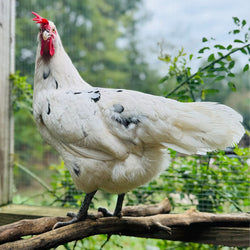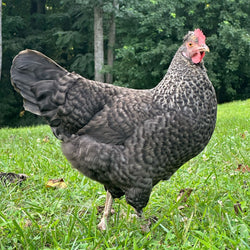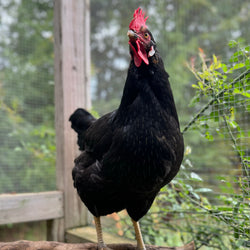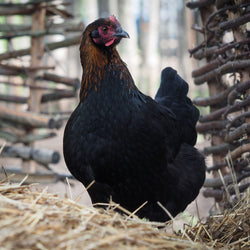f=menu&page=55/--
Frequently Asked Questions
Here we answer the most commonly-asked questions about ordering, chicken care, and more.
What is vent gleet and how can I treat my chickens that have it?
In baby chicks, pasty butt (a.k.a. pasted vent) occurs when poo dries in the chick's vent (her pooper) and the blockage prevents her from defecating. This is a critical situation for a baby chick and should be addressed immediately because it can be fatal. By the time your bird is an adult layer, her muscles are pretty well developed for expulsion, and the vent can expand significantly (large enough to pass an egg, right?). So, adult hens seldom (perhaps never!) suffer from pasty butt. That said, they can certainly get vent feathers messy with loose poo, and that can...
Read MoreWhat happens if a duckling or gosling is incorrectly sexed?
It's always disappointing when a bird isn't sexed correctly, especially if your "girl" ended up being a "boy" and was the family's favorite bird! Unfortunately, since waterfowl sexing is an art, not a science, sometimes errors do occur. To report an error, first be sure you are reporting during the correct reporting period! Early or late reports can't be processed. Sexing errors must be reported when the waterfowl are 10 to 22 weeks old. Second, to make your report, email, chat, or give us a call at 908-795-1007. Third, be sure to provide the name under which the order was...
Read MoreHow can I track my baby chick package? Do you provide a tracking number?
We will send you an email with the tracking number for your order when your chicks "fly the coop," and you can use that to follow their progress. We mark our shipments "CALL ON ARRIVAL," and most post offices ask customers to pick up their peeping packages right at the post office. The phone number(s) you provide will be on the shipping label so they can contact you. (Some post offices deliver them right to your door instead of asking you to pick them up, however.) We recommend that you go to your local post office, let them know you...
Read MoreWhat is a "heritage" chicken breed?
The definition of "heritage" in relation to chicken breeds is a bit flexible, but when we use the word, we're referring to breeds that have been around a long time, are non-hybrid, genetically stable, naturally-mating, and outdoor-hardy breeds that have proven valuable for generations. Heritage breeds are ones that have been around long enough to prove their usefulness as either egg layers, meat breeds, or dual-purpose breeds, and to become genetically stable--able to reproduce offspring true to the breed. As such, heritage breeds cannot be hybrids ("mutts" - the offspring of two different breeds), because hybrids do not breed true...
Read MoreHow much does it cost to raise chickens?
You knew this already: that depends on many different factors. Most importantly, it depends on what type of eggs you're buying at the grocery store. If you're buying the pricey, organic and/or pasture-raised eggs, then yes, it's possible to save money with a flock of your own. If you're looking to save money by keeping chickens.
Read MoreCan you ship chicks and waterfowl together?
Our chicks and waterfowl are hatched in different facilities and therefore, cannot be shipped together. If you would like for your waterfowl and chicks to arrive the same week, be sure to choose the same shipping week for your waterfowl and baby chick orders when you checkout.
Read MoreWhen should I take my pet chicken to the vet?
As keepers of pet chickens, we've all been there. You notice one of your birds exhibiting some unusual behaviors or symptoms, and you're faced with a dilemma: What do you do? What is causing the symptoms and how can you help? Is what you're seeing normal chicken behavior, a minor issue that may resolve itself, or serious problem that warrants a professional help? Let's be honest: You don't want to pay a big vet bill only to find out it's nothing serious, but you also don't want to assume it's nothing serious and have it turn out to be something...
Read MoreWhich chicken breeds may need extra heat in winter?
Chickens are incredibly adaptable! They are kept all over the world in all kinds of extreme climates. But it's no secret that some breeds are hardier in cold weather than others. Some breeds were not developed for cold-hardiness or have characteristics that make them more susceptible to cold than others. In a well-ventilated but not drafty coop, most chickens can stay warm by fluffing up their feathers to trap a layer of warm air against their bodies--as long as they are not wet and or exposed to a draft. Drafts can remove that "jacket" of warmer air surrounding the bird....
Read More







"The Clubhouse" Coop
Easy to assemble and built to last, the Clubhouse Coop is the perfect starter coop for a small flock.











